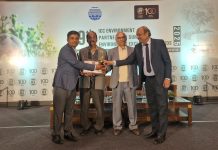
Signs throughout the COP30 Leaders Summit outside the Parque da Cidade, the primary place for the COP30 top, in Belem, Para state, Brazil|Picture Credit: DADO GALDIERI
< div id ="ControlPara" itemprop ="articleBody">
UN environment settlements were anticipated to start on Monday at a conference on the edge of the Brazilian Amazon, with leaders promoting seriousness, cooperation and velocity after more than 30 years combating to suppress worldwide warming by considerably minimizing the carbon contamination that triggers it.
Andre Correa do Lago, president of this year’s conference, referred to as COP30, stressed that mediators participate in “mutirao,” a Brazilian word originated from an Indigenous word that describes a group joining to deal with a shared job.
“Either we choose to alter by option, together, or we will be enforced modification by disaster,” Lago composed in his letter to mediators on Sunday. “We can alter. We need to do it together.” Making complex the calls for togetherness is the United States. The Trump administration did not send out top-level mediators to the talks and is withdrawing for the 2nd time from the 10-year-old Paris Agreement, which is being commemorated as a partial accomplishment here in Belem.
The United States has actually put more heat-trapping co2 into the air from the burning of coal, oil and gas than any other nation. China is the No. 1 carbon polluter now, however due to the fact that co2 remains in the air for a minimum of a century, more of it was made in the United States.
“I believe the environment we remain in, the geopolitical landscape, is especially tough,” said Palau Ambassador Ilana Seid, who chairs the Alliance of Small Island States. Small island nations suffer some of the worst effects of climate change because rising seas swallow land. “The United States’ withdrawal from the Paris Agreement has actually moved the gravity of the entire negotiating system.
President Donald Trump’s actions harm the battle versus environment modification, previous United States Special Envoy for Climate Todd Stern stated.
“It’s an advantage that they are not sending out anybody. It wasn’t going to be positive if they did,” he said.
The Nature Conservancy chief scientist Katharine Hayhoe compared the negotiations to a potluck dinner.
“Everybody brings the contributions that they are making,” which in this instance are new and strengthened plans to cut carbon pollution, Hayhoe said. “And it’s obvious who took the time to bake the fresh pie with fruit that they picked and who fished out that year-old chicken frozen chicken nuggets from the back of their freezer.” “The United States as a country will not be showing up with a dish,” Hayhoe said. However, she and several others, including former lead American negotiators, are pointing to US cities, states and businesses that they said will take up the slack.
In a letter to negotiators released late Sunday, Simon Stiell, the UN climate chief, said the 10-year-old Paris Agreement is working to a degree, “but we must accelerate in the Amazon. Devastating climate damages are happening already, from Hurricane Melissa hitting the Caribbean, Super Typhoons smashing Vietnam and the Philippines, to a tornado ripping through Southern Brazil.” Not only must nations do more faster, but they “must connect climate action to people’s real lives,” Stiell wrote. (AP) SKS SKS
Published on November 10, 2025




